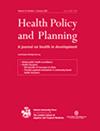An analysis of Nepal's Draft Mental Health Act 2006-2017: Competing values and power.
IF 2.9
3区 医学
Q2 HEALTH CARE SCIENCES & SERVICES
引用次数: 0
Abstract
This qualitative study maps the process of drafting and consulting on Nepal's mental health legislation from 2006 to 2017. Fourteen people were interviewed, and interviews were analysed thematically. These themes were subsequently interpreted in light of Shiffman and Smith's policy analysis framework, as the process was found to be at the agenda-setting stage. Two groups of actors were identified with different views on appropriate policy content and how the policy process should be conducted. The first group included psychiatrists who initiated and controlled the drafting process, and who did not consider people with psychosocial disabilities to be equal partners. The psychiatrists viewed forced detention and treatment as upholding people's Right to Health and lobbied the Ministry of Health and Population (MoHP) to pass the draft Acts to Parliament. The second included the rights-based civil society actors and lawyers who saw the Right to Equality before the Law as of utmost priority, opposed forced detention and treatment, and actively blocked the draft Acts at the MoHP. There is no clear legal definition of mental health and illness in Nepal, legal and mental capacity are not differentiated, and people with mental and behavioural conditions are assumed to lack capacity. The analysis indicates that there were few favourable conditions to support the progression of this policy into law. It is unclear whether the drafters or blockers will prevail in the future, but we predict that professionals will continue to have more input into content than service users due to national policy dynamics.尼泊尔《2006-2017 年精神健康法草案》分析:相互竞争的价值观和权力。
本定性研究描绘了 2006 年至 2017 年尼泊尔心理健康立法的起草和咨询过程。共采访了 14 人,并对采访内容进行了专题分析。随后根据 Shiffman 和 Smith 的政策分析框架对这些主题进行了解释,因为研究发现这一过程正处于议程设置阶段。我们发现有两类参与者对适当的政策内容和如何开展政策进程持有不同的观点。第一类包括精神科医生,他们发起并控制了起草过程,而且不认为社会心理残疾者是平等的合作伙伴。精神科医生认为强制拘留和治疗维护了人们的健康权,并游说卫生与人口部(MoHP)将法案草案提交议会通过。第二类包括以权利为基础的民间社会行动者和律师,他们将法律面前人人平等的权利视为重中之重,反对强制拘留和治疗,并在卫生和人口部积极阻挠法案草案的通过。在尼泊尔,精神健康和精神疾病没有明确的法律定义,法律行为能力和精神行为能力也没有 区分,有精神和行为问题的人被认为缺乏行为能力。分析表明,支持这项政策成为法律的有利条件并不多。目前还不清楚未来是起草者还是阻挠者占上风,但我们预测,由于国家政策的动态变化,专业人士对内容的投入将继续多于服务使用者。
本文章由计算机程序翻译,如有差异,请以英文原文为准。
求助全文
约1分钟内获得全文
求助全文
来源期刊

Health policy and planning
医学-卫生保健
CiteScore
6.00
自引率
3.10%
发文量
98
审稿时长
6 months
期刊介绍:
Health Policy and Planning publishes health policy and systems research focusing on low- and middle-income countries.
Our journal provides an international forum for publishing original and high-quality research that addresses questions pertinent to policy-makers, public health researchers and practitioners. Health Policy and Planning is published 10 times a year.
 求助内容:
求助内容: 应助结果提醒方式:
应助结果提醒方式:


